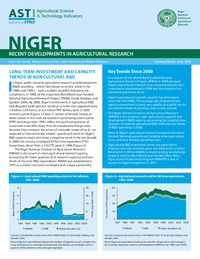Authors:
Stads, Gert-Jan; Issoufou, Mourima; Massou, Aboubacar Malam
Year:
2010
Publisher
International Food Policy Research Institute (IFPRI); and Niger National Institute of Agricultural Research (INRAN)
Back to:
Niger is one of the African countries with the lowest rate of investment in agricultural research: only 0.25 percent of its AgGDP in 2008. The country’s agricultural R&D expenditure in 2008 showed an 80 percent drop compared with the level recorded in 1998, the year in which the World Bank loan-financed PNRA reached completion. Niger’s agricultural research (particularly INRAN) has had to face a most difficult financial situation ever since. INRAN’s research program is entirely donor funded and the government’s annual allocation does not even cover all of the salary costs. As a result, the institute has to generate resources in-house in order to make ends meet. Niger’s agricultural R&D investment levels are, however, expected to start increasing again in the near future, with the national launching of WAAPP, funded through a World Bank loan, as well as with the implementation of several large AGRA-funded research projects. An upgrade of INRAN’s official status to that of a “public institution of a cultural, scientific, and technical nature” is also expected to have a positive effect on the institute’s future investment levels.
The crisis has left a negative mark on Niger’s agricultural research capacity levels. During 2005–08, INRAN’s contingent of researchers holding PhD degrees decreased from 26 to 17 FTEs, partly due to the departure of several highly qualified researchers, who left the institute for better-paid jobs with nongovernmental or international research organizations. In addition, a public-sector recruitment freeze is causing the average researcher age to soar. As dozens of the government-agency researchers will be retiring in the next fifteen years, attracting and training young researchers is a matter of crucial importance if Niger is to maintain a critical mass of agricultural scientists. With the recent establishment of a national advisory board, CNRA, there is hope that sustainable funding and recruitment and training of agricultural R&D staff will be given a more prominent place on Niger’s political agenda in the years to come.

